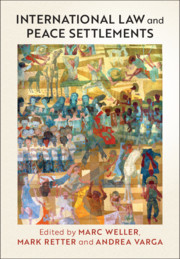Book contents
- International Law and Peace Settlements
- International Law and Peace Settlements
- Copyright page
- Contents
- Contributors
- Preface and Acknowledgements
- Case Law
- Peace Agreements and Instruments
- Abbreviations
- 1 Introduction
- Part I Historical Dimensions to Peace Settlement Practice
- Part II Peace Agreements As Legal Instruments
- Part III Key Actors and the Role of International Law
- Part IV Representation, Sovereignty and Governance
- Part V Economic Aspects of Peace Settlements
- 20 Political Economy, International Law and Peace Agreements
- 21 Balancing National Ownership with International Intervention
- 22 Sharing Resource Wealth in Conflict Settlements
- 23 Overcoming Violence in Maritime Conflicts with Provisional Arrangements
- 24 Financing Peace through Law?
- Part VI Humanitarian Obligations and Human Rights
- Conclusion
- Index
20 - Political Economy, International Law and Peace Agreements
from Part V - Economic Aspects of Peace Settlements
Published online by Cambridge University Press: 14 January 2021
- International Law and Peace Settlements
- International Law and Peace Settlements
- Copyright page
- Contents
- Contributors
- Preface and Acknowledgements
- Case Law
- Peace Agreements and Instruments
- Abbreviations
- 1 Introduction
- Part I Historical Dimensions to Peace Settlement Practice
- Part II Peace Agreements As Legal Instruments
- Part III Key Actors and the Role of International Law
- Part IV Representation, Sovereignty and Governance
- Part V Economic Aspects of Peace Settlements
- 20 Political Economy, International Law and Peace Agreements
- 21 Balancing National Ownership with International Intervention
- 22 Sharing Resource Wealth in Conflict Settlements
- 23 Overcoming Violence in Maritime Conflicts with Provisional Arrangements
- 24 Financing Peace through Law?
- Part VI Humanitarian Obligations and Human Rights
- Conclusion
- Index
Summary
nternational lawyers and political economists look at exits from armed conflict from different perspectives. From a legal perspective, the role of law has been to provide a framework to regulate the use of force and to articulate a common vision of the pathways towards constitutional democracies. In the post-Cold War period, the UN and other international actors hoped to end armed conflict through peace agreements, peacekeeping, statebuilding and peacebuilding – summarised as creating a ‘liberal peace’. But armed conflicts have become internal and complex – and there has been widespread recognition that the ‘liberal peace’ has not, and cannot, deliver. From a political economy perspective, the process of forming political settlements gives some explanation: law is less relevant than the reordering of partisan interests of power holders. This questions the viability of attempts to build a ‘liberal peace’. The insights of political economy are thus a reality check to inform the search for viable alternatives to prevent or exit violent conflict.
- Type
- Chapter
- Information
- International Law and Peace Settlements , pp. 449 - 473Publisher: Cambridge University PressPrint publication year: 2021



